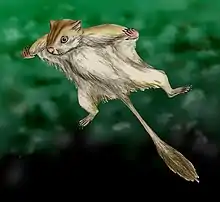| Eomyidae Temporal range: | |
|---|---|
 | |
| Artist's impression of Eomys | |
| Scientific classification | |
| Domain: | Eukaryota |
| Kingdom: | Animalia |
| Phylum: | Chordata |
| Class: | Mammalia |
| Order: | Rodentia |
| Superfamily: | †Eomyoidea |
| Family: | †Eomyidae Winge, 1887 |
| Subfamilies | |
|
†Apeomyinae | |
Eomyidae is a family of extinct rodents from North America and Eurasia related to modern day pocket gophers and kangaroo rats. They are known from the Middle Eocene to the Late Miocene in North America and from the Late Eocene to the Pleistocene in Eurasia.[1] Eomyids were generally small, but occasionally large, and tended to be squirrel-like in form and habits.[2] The family includes the earliest known gliding rodent, Eomys quercyi.[3]
The family includes the following genera:[4]
- Simiacritomys (placement uncertain)[5]
- Symplokeomys[6]
- Subfamily Yoderimyinae
- Litoyoderimys
- Yoderimys
- Zaisaneomys
- Zemiodontomys
- Subfamily Apeomyinae[7]
- Apeomyoides[8]
- Apeomys
- Arikareeomys[8]
- Megapeomys[7]
- Zophoapeomys[9]
- Subfamily Eomyinae
- Adjidaumo
- Aguafriamys
- Asianeomys[10]
- Aulolithomys
- Centimanomys
- Comancheomys
- Cristadjidaumo[11]
- Cupressimus
- Eomyodon
- Eomyops
- Eomys
- Estramomys
- Japaneomys
- Kansasimys
- Keramidomys
- Leptodontomys
- Ligerimys
- Metadjidaumo
- Metanoiamys
- Meteomys
- Montanamus
- Namatomys
- Neoadjidaumo[12]
- Orelladjidaumo
- Paradjidaumo
- Paranamatomys
- Pentabuneomys
- Protadjidaumo
- Pseudadjidaumo
- Pseudotheridomys
- Rhodanomys
- Ritteneria
- Ronquillomys
- Viejadjidaumo
References
- ↑ Emry et al. 1997; McKenna & Bell 1997; Flynn 2007, p. 415.
- ↑ Flynn 2007, p. 415.
- ↑ Storch, Engesser & Wuttke 1996.
- ↑ McKenna & Bell 1997; Flynn 2007.
- ↑ Flynn 2007, pp. 417–418.
- ↑ Emry et al. 1997.
- 1 2 Fejfar, Rummel & Tomida 1998.
- 1 2 Smith, Cifelli & Czaplewski 2006.
- ↑ Korth 2007.
- ↑ Maridet et al. 2011.
- ↑ Emry & Korth 2012.
- ↑ Korth 2008.
Literature cited
- Emry, R.J.; Korth, W.W. (2012). "Early Chadronian (late Eocene) rodents from the Flagstaff Rim area, central Wyoming". Journal of Vertebrate Paleontology. 32 (2): 419–432. doi:10.1080/02724634.2012.649329. S2CID 128773831.
- Emry, R.J.; Wang, B.; Tjutkova, L.A.; Lucas, S.G. (1997). "A Late Eocene eomyid rodent from the Zaysan Basin of Kazakhstan". Journal of Vertebrate Paleontology. 17 (1): 229–234. doi:10.1080/02724634.1997.10010966.
- Fejfar, O.; Rummel, M.; Tomida, Y. (1998). "New eomyid genus and species from the Early Miocene (MN zones 3–4) of Europe and Japan related to Apeomys (Eomyidae, Rodentia, Mammalia)". National Science Museum Monographs. 14: 123–143.
- Flynn, L.J. (2007). "Eomyidae". In Janis, C.M.; Gunnell, G.F.; Uhen, M.D (eds.). Evolution of Tertiary Mammals of North America. Volume 2: Small Mammals, Xenarthrans, and Marine Mammals. Cambridge, England; New York: Cambridge University Press. pp. 415–427.
- Korth, W.W. (2007). "Mammals from the Blue Ash local fauna (Late Oligocene), South Dakota. Rodentia, Part 1: Families Eutypomyidae, Eomyidae, Heliscomyidae, and Zetamys". Paludicola. 6 (2): 31–40.
- Korth, W.W. (2008). "Early Arikareean (Late Oligocene) Eomyidae (Mammalia, Rodentia) from Nebraska". Paludicola. 6 (4): 144–154.
- Maridet, O.; Wu, W.; Ye, J.; Ni, X.; Meng, J. (2011). "New discoveries of glirids and eomyids (Mammalia, Rodentia) in the Early Miocene of the Junggar basin (Northern Xinjiang province, China)". Swiss Journal of Palaeontology. 130 (2): 315–323. doi:10.1007/s13358-011-0022-7. S2CID 128746601.
- McKenna, M.C.; Bell, S.K. (1997). Classification of Mammals: Above the Species Level. New York: Columbia University Press. p. 631. ISBN 978-0-231-11013-6.
- Smith, K.S.; Cifelli, R.L.; Czaplewski, N.J. (2006). "A new genus of eomyid rodent from the Miocene of Nevada". Acta Palaeontologica Polonica. 51 (2): 385–392.
- Storch, G.; Engesser, B.; Wuttke, M. (1996). "Oldest fossil record of gliding in rodents". Nature. 379 (6564): 439–441. doi:10.1038/379439a0. S2CID 4326465.
This article is issued from Wikipedia. The text is licensed under Creative Commons - Attribution - Sharealike. Additional terms may apply for the media files.